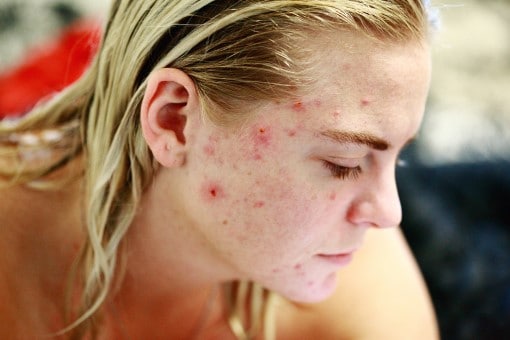
Can insomnia really make acne worse? – Why it might and what to do
By Jason Wooden, PhD
If you’re wondering whether insomnia can make your acne worse, you’re not alone. With over 40 million acne sufferers and 1 in 3 Americans waking up sleep deprived, this is likely a question for many others.
Although the link between the two has not been well studied, there may be a connection. Stress, anxiety, and inflammation can cause acne. Research has shown that poor sleep can trigger all three making it possible for ongoing insomnia to aggravate acne.
Your options to prevent insomnia-related acne include sleep hygiene and checking for underlying sleep issues. You should also make sure you’re following the basic recommendations for acne prevention and skin care.
“No one remembers it; none of my friends remember me having it, but I had really bad acne for, like years.“
Alden Ehrenreich, actor
Why it matters to more people than you think whether insomnia can make acne worse
Why it matters to more people than you think whether insomnia makes acne worse
Can insomnia really make your acne worse?
It’s a fair question and you’re not the only one asking it.
At any given time, there are over 40 million Americans who have acne according to the American Academy of Dermatology.
Currently, 1 in 3 Americans wake up sleep deprived.
If insomnia is a risk factor, that’s a lot of people whose poor sleep could be increasing their risk for Acne.
Acne is a disease in which the pores under your skin get clogged and form pimples. For some, it can lead to more permanent facial marks.
It can leave people feeling anxious, embarrassed, and a bit down.
Did you know that there are some pretty famous people who have struggled with it?
Cameron Diaz, Angelina Jolie, Miley Cyrus, Olivia Munn, Kate Winslet, and many others have had their battles. (Some of them talk about their struggles here.)
Male celebs such as Brad Pitt, Justin Bieber, and Leonardo DiCaprio have had to deal with acne.
While its more common with teens, adults can get it too. In fact, 50% of women in their 20’s and 26% of women in their forties have acne.
And whether you’re a teen or an adult, it can be a real bummer.
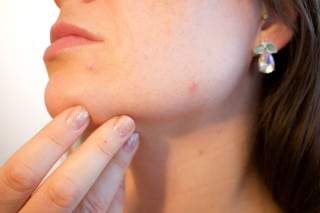

Waiting for it to clear can be incredibly frustrating, so it’s natural to want to know what else you can do, including sleep.
So, lets take a serious look at what’s we know about acne and its link to insomnia.
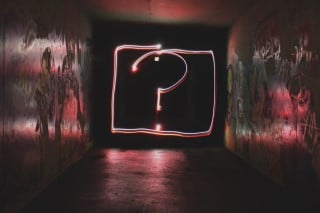
Why do people get acne?
Before we get into how insomnia could make acne worse, we need to talk about why people get acne in the first place.
Acne happens when too much oil is made by hair follicles.
The excess oil can cause the skin pores to get clogged with dead skin cells, bacteria that normally live on the skin, or both.
An acne pimple can get inflamed as bacteria stuck inside of a pore multiply and grow.
Here are some of the things that can cause or worsen acne:
Hormonal changes
Hormonal changes can trigger acne, especially during puberty in boys and girls. It can also be triggered during pregnancy or when oral contraceptives are used. (Birth control pills contain synthetic versions of the female sex hormones.)
Medications
Some meds can cause or aggravate acne. They include steroids, antibiotics, antidepressants, and others.
Inflammation
We’ve known for years that some acne pimples can get inflamed when clogged with bacteria.
Inflammation is now believed to also be a trigger for acne by itself. (Some experts are even describing acne as primarily an inflammatory disorder.)
While more research is needed to tease out what’s going on, one possibility is that inflammation in the body from stress or other causes results in damage to the hair follicles.
Diet
Some foods such as milk and high glycemic carbs may actually worsen acne.
Dairy is believed to cause inflammation in the body and skin pores. The sugar spikes are thought to trigger the body to make more oil in the skin
More about food and acne breakouts
Stress and Anxiety
Emotional stress can trigger breakouts and worsen acne. In fact, some people get “stress breakouts” when going through a difficult period in life.
Stress hormones stimulate the skin to produce more pore-clogging oil. Chronic stress can cause more inflammation in the body which can lead to more acne.
Anxiety can cause the release of stress hormones too. With 40 million adults living with anxiety disorders in the US alone, that’s a lot of people who could be at higher risk for acne.
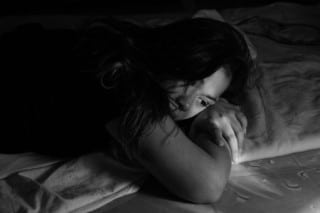
Can insomnia make my acne worse?
Okay, now we get to what you were really wondering about – can insomnia really make your acne worse?
It’s a fair question since so many people are sleep deprived. Poor sleep is now a huge issue for teens too since most aren’t getting the recommended 8 to 10 hours.
Well, the truth is that the link between the sleep and acne hasn’t been well-researched. So, we don’t have a direct answer.
However, it turns out that quite a bit is known about the health effects of insomnia.
Prolonged insomnia can cause stress and anxiety which are known to trigger or worsen acne. (In fact, new research suggests that sleep deprivation can cause an anxiety disorder.)
Researchers have also found that sleep disruptions can affect neurotransmitter and stress hormones.
Finally, ongoing insomnia has been associated with increased inflammation in the body.
So, can insomnia really make acne worse?
It’s quite possible that when you don’t get enough sleep you become more stressed, anxious, and prone to inflammation which can worsen your acne.
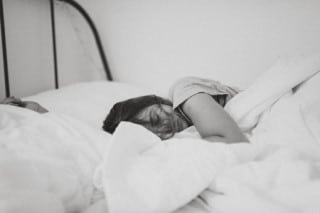
Can sleeping too much cause acne?
Whether you’re a regular late riser or simply like sleeping in on the weekends, you may be wondering if sleeping too much can cause acne.
Okay, this is another issue that hasn’t been well studied, but there is research that has found a connection between excessive sleep and inflammation.
And we’ve already talked about the role that inflammation plays in acne.
In one study, Dutch researchers looked at the link between sleep duration and biomarkers of inflammation in 2,553 adults.
(A biomarker is just something such as a protein or substance that researchers know is involved in a biological process and they can track.)
What they found is that the people who slept 10 or more hours at night had higher levels of some of the biomarkers, indicating more inflammation in the body.
More research will be needed to tease out what this all means, but their findings suggest that when you over sleep you get more inflammation which can trigger acne.
On the surface this doesn’t make sense if it’s true that insomnia can worsen acne, but maybe there’s a sweet spot for sleep.
Too little or too much, your chances for inflammation and acne go up.
Nonetheless, can sleeping too much cause acne?
Maybe.
Can sleeping too much cause acne?
Okay, this is another issue that hasn’t been well studied, but there is research that has found a connection between excessive sleep and inflammation.
And we’ve already talked about the role that inflammation plays in acne.
In one study, Dutch researchers looked at the link between sleep duration and biomarkers of inflammation in 2,553 adults.
(A biomarker is just something such as a protein or substance that researchers know is involved in a biological process and they can track.)
What they found is that the people who slept 10 or more hours at night had higher levels of some of the biomarkers, indicating more inflammation in the body.
More research will be needed to tease out what this all means, but their findings suggest that when you over sleep you get more inflammation which can trigger acne.
On the surface this doesn’t make sense if it’s true that insomnia can worsen acne, but maybe there’s a sweet spot for sleep.
Too little or too much, your chances for inflammation and acne go up.
Nonetheless, can sleeping too much cause acne?
Maybe.
If insomnia can make acne worse, what can I do for my sleep?
First off, start paying more attention to your acne breakouts and when you have bouts of insomnia.
Obviously, if you sleep poorly on an ongoing basis you need to take your insomnia more seriously.
But you should also take it serious for other reasons too, whether or not it’s involved with your acne.
We know how important sleep is for getting through the day. After a night of insomnia, your brain doesn’t work as well as it should, you have a harder time learning, and don’t cope as well.
Also, insomnia has been linked to high blood pressure, cardiovascular disease, obesity, depression, and dementia.
So, its important to get on top of this for acne, but also for your long-term health and happiness.
You should start practicing good sleep hygiene.
This is what you do during the day and at bedtime that can set the stage for a great night of sleep. It focuses on things such as avoiding naps or stimulants and your bedtime routine.
Sleep Hygiene Tips
- Keep consistent wake up and sleep times
- Avoid naps
- Exercise during the day
- Avoid large meals, alcohol, or stimulants such as caffeine before bedtime
- Maintain a bedtime routine to wind down
- Avoid using TVs, laptops, or other electronics before sleep
- Keep your sleep environment dark, cool, quiet, and relaxing
Be sure to also get help from a doctor. There are other health issues that could be causing problems for your sleep such as asthma, diabetes, or chronic pain.
Are you a snorer? It could be wrecking your sleep. You could also have a sleep disorder such as sleep apnea. (Yes, young adults can get it too.)
Even with the best sleep hygiene, these underlying issues can sabotage your sleep if you ignore them.
How much sleep should I get?
Teens: 8 to 10 hours
Adults: 7 to 9 hours
Source: National Sleep Foundation
What else can I do for my acne?
Even if you suspect insomnia is making your acne worse, make sure you’re following the basic recommendations for acne prevention. There could be multiple causes for your acne.
Consider scheduling an appoint with a dermatologist. They can still be useful even if you don’t have severe acne.
The American Academy of Dermatology recommends you see a dermatologist if:
- Your acne causes you to feel shy or embarrassed
- The products you’ve tried haven’t worked
- Your acne leaves scars or darkens the skin
If you’re still not sure, take this quick quiz:
Is it time to see a dermatologist?
You should also practice good skin care which includes regular face washing and gentle treatment.
And don’t forget about the other things that could be increasing your risk for acne:
Diet
Research suggest that some food types may lead to more pimples so pay more attention to what you eat and when you have breakouts.
Stress
If you’re prone to stress flare ups, take steps to keep your stress under control.
You can try exercise, meditation, yoga, and other relaxation techniques. There are other things you can do such as lifestyle changes.
Anxiety
If you’re dealing with an anxiety disorder, be sure you’re taking it seriously and getting help. Don’t forget that anxiety can activate stress hormones which can cause or worsen acne.
Anxiety is treatable, but all too many people do nothing. There’s a lot you can actually do on your own but be sure to see a specialist.
Acne Prevention Tips
- Wash twice a day and after sweating
- Be gentle with your skin
- Use fingertips to apply a gentle, non-abrasive cleanser
- Use gentle skin products
- Avoid scrubbing your skin
- Rinse with lukewarm water
- Shampoo regularly
- Let your skin heal naturally, don’t pick your acne
- Keep hands off your face
- Stay out of the sun & tanning beds
Source: American Academy of Dermatology
If you’re worried about insomnia making your acne worse, remember:
- Ongoing insomnia can lead to stress, anxiety, and inflammation
- Stress, anxiety, and inflammation are triggers for acne
- For better sleep, practice good sleep hygiene and see a doctor
- Make sure you’re doing the basics for acne prevention
Sources:
1. “Acne”, American Academy of Dermatology website
2. A review of diagnosis and treatment of acne in adult female patients, Int J Womens Dermatol. 2018 Jun; 4(2): 56–71.
3. Acne: a new model of immune-mediated chronic inflammatory skin disease, G Ital Dermatol Venereol. 2015 Apr;150(2):247-54.
4. The Response of Skin Disease to Stress: Changes in the Severity of Acne Vulgaris as Affected by Examination Stress, Arch Dermatol. 2003 Jul;139(7):897-900.
5. Inflammation: The Common Pathway of Stress-Related Diseases, Front Hum Neurosci. 2017; 11: 316.
6. “Facts & Statistics”, ADAA website
7. “Teens and Sleep” National Sleep Foundation website
8. “Understanding the Facts: Sleep Disorders”, ADAA website
9. “Sleep and mental health”, 2919, Harvard Health Publishing website
10. Persistent Insomnia is Associated with Mortality Risk, Am J Med. 2015, Volume 128, Issue 3, Pages 268–275.e2
11. Sleep duration, insomnia, and markers of systemic inflammation: Results from the Netherlands Study of Depression and Anxiety (NESDA), J Psychiatr Res. 2015; 60: 95–102.
Connect with us:
About Us
Better Sleep Simplified® was founded as a place for you to get clear and well-researched information.
Our goal is to make sure you know about your options so that you take action sooner rather than later.
Check us out on YouTube:
Watch and Learn
Helpful sleep tips, interesting sleep facts and statistics you want to know about
Affiliate Disclosure
This site is a participant in the Amazon Services LLC Associates Program and other affiliate advertising programs designed to provide a means for sites to earn advertising fees by advertising and linking to them.
Important: BetterSleepSimplified.com is for informational purposes only and is not intended or implied to be a substitute for professional medical advice, diagnosis, or treatment. Always consult a physician for sleep and health concerns. See additional information.
